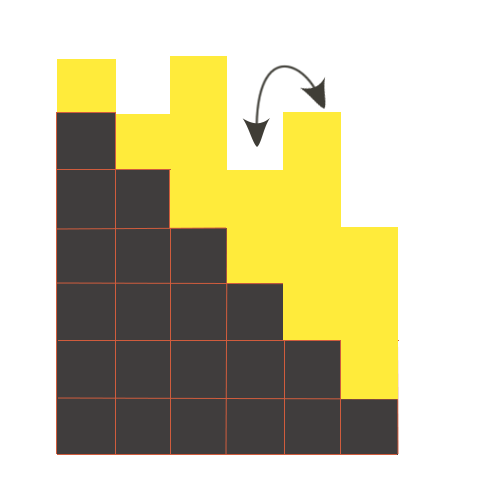Codeforces 549G. Happy Line 贪心
很有意思的贪心:
Let‘s reformulate the condition in terms of a certain height the towers, which will be on the stairs. Then an appropriate amount of money of a person in the queue is equal to the height of the tower with the height of the step at which the tower stands. And the process of moving in the queue will be equivalent to raising a tower on the top step, and the one in whose place it came up — down. As shown in the illustrations. Then, it becomes apparent that to make all of the tower on the steps to be sorted, it is enough to sort the tower without the height of step it stays. Total complexity of sorting is O(nlog(n)).


Do you like summer? Residents of Berland do. They especially love eating ice cream in the hot summer. So this summer day a large queue of n Berland residents lined up in front of the ice cream stall. We know that each of them has a certain amount of berland dollars with them. The residents of Berland are nice people, so each person agrees to swap places with the person right behind him for just 1 dollar. More formally, if person a stands just behind person b, then person a can pay person b 1 dollar, then a and b get swapped. Of course, if persona has zero dollars, he can not swap places with person b.
Residents of Berland are strange people. In particular, they get upset when there is someone with a strictly smaller sum of money in the line in front of them.
Can you help the residents of Berland form such order in the line so that they were all happy? A happy resident is the one who stands first in the line or the one in front of who another resident stands with not less number of dollars. Note that the people of Berland are people of honor and they agree to swap places only in the manner described above.
The first line contains integer n (1?≤?n?≤?200?000) — the number of residents who stand in the line.
The second line contains n space-separated integers ai (0?≤?ai?≤?109), where ai is the number of Berland dollars of a man standing on thei-th position in the line. The positions are numbered starting from the end of the line.
If it is impossible to make all the residents happy, print ":(" without the quotes. Otherwise, print in the single line n space-separated integers, the i-th of them must be equal to the number of money of the person on position i in the new line. If there are multiple answers, print any of them.
2 11 8
9 10
5 10 9 7 10 6
:(
3 12 3 3
4 4 10
In the first sample two residents should swap places, after that the first resident has 10 dollars and he is at the head of the line and the second resident will have 9 coins and he will be at the end of the line.
In the second sample it is impossible to achieve the desired result.
In the third sample the first person can swap with the second one, then they will have the following numbers of dollars: 4 11 3, then the second person (in the new line) swaps with the third one, and the resulting numbers of dollars will equal to: 4 4 10. In this line everybody will be happy.
/* ***********************************************
Author :CKboss
Created Time :2015年06月09日 星期二 00时24分13秒
File Name :CF549.cpp
************************************************ */
#include <iostream>
#include <cstdio>
#include <cstring>
#include <algorithm>
#include <string>
#include <cmath>
#include <cstdlib>
#include <vector>
#include <queue>
#include <set>
#include <map>
using namespace std;
const int maxn=200200;
int n,a[maxn],base[maxn],b[maxn];
int main()
{
//freopen("in.txt","r",stdin);
//freopen("out.txt","w",stdout);
scanf("%d",&n);
for(int i=0;i<n;i++)
{
scanf("%d",a+i);
base[i]=n-1-i;
b[i]=a[i]-base[i];
}
sort(b,b+n);
bool flag=true;
for(int i=0;i<n;i++)
{
a[i]=base[i]+b[i];
if(i&&a[i]<a[i-1])
{
flag=false; break;
}
}
if(flag==false)
{
puts(":(");
}
else
{
for(int i=0;i<n;i++)
printf("%d%c",a[i],(i==n-1)?10:32);
}
return 0;
}郑重声明:本站内容如果来自互联网及其他传播媒体,其版权均属原媒体及文章作者所有。转载目的在于传递更多信息及用于网络分享,并不代表本站赞同其观点和对其真实性负责,也不构成任何其他建议。





































